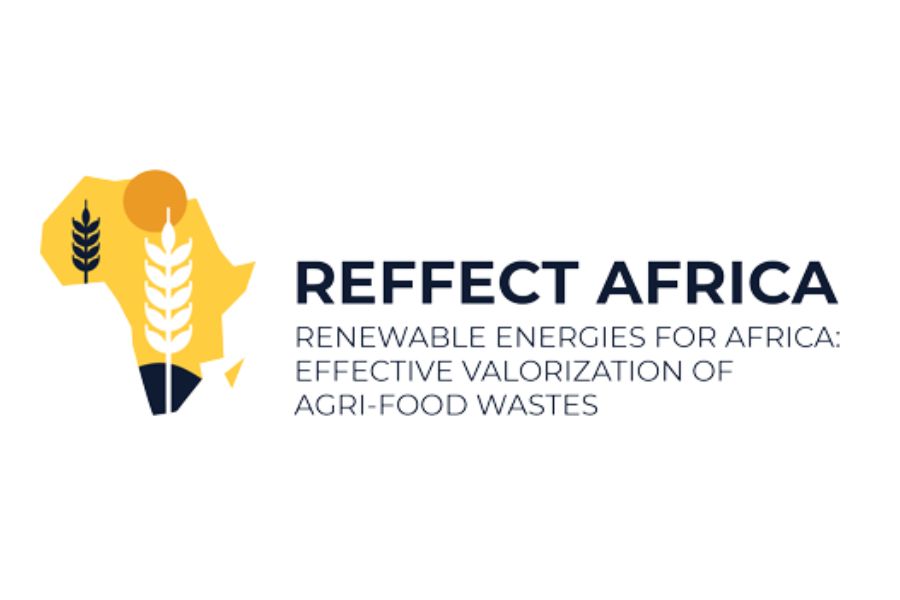Project Name: RENEWABLE ENERGIES FOR AFRICA: EFFECTIVE VALORIZATION OF AGRI-FOOD WASTES
Open Call Topic(s): Green transition in Europe
Description
REFFECT AFRICA will adapt and optimize these technologies to a wide variety of biomass wastes: olive mill residues, almond hulls and husks, millet, rice, sorghum or peanut wastes and sugarcane bagasse, among others locally available.
Three full- scale demo-side will be built in Morocco, Ghana and South Africa to consider both urbanized and rural contexts in Africa, on- and off-grid solutions, as well as different socio-economic backgrounds.
The project will carry out comprehensive LCA and LCC of each supply chain and will consider the climate adaptation and mitigation potential of this technology compared to other technologies and solutions in the African social, economic and environmental contexts.
REFFECT AFRICA will tackle the development of renewable energy sources, providing solutions for on-grid and off-grid communities, and their integration into the existing energy system. It will consider the generation of renewable energy, the transmission, and the use of storage systems.
With the aim of closing all water-energy-food links, the project will work on obtaining biochar from the gasifier and will be improved to provide valuable fertilizer to local farmers. The demonstrators will include a robust but reliable water laboratory to provide their location with basic but often lacking testing services.
Reason for applying to HSbooster.eu services
The REFFECT Africa project consists of 29 partners, including partners from European and African countries.
Therefore, the standardization between the partners does not follow the same format, and some difficulties have been experienced during the first year of the project due to this issue.
Thus, there is a need for REFFECT Africa to create and monitor new standards and to guide partners in the use of existing ones. For this reason, we are preparing this application for the Standardisation Booster service.
The Standardisation Booster will be essential as it will provide practical guidance to assess the readiness of the project results, for compliance and to compare them with standardisation experts who can guide the project on how these results can be integrated into standardisation working groups or technical committees.
Main Standardisation Interests
Three full-scale demo sides will be constructed in Morocco, Ghana and South Africa to consider both urban and rural contexts in Africa as well as different socio-economic background contexts.
Thus a special task (Task 10.1) has been created, and integrated into the work plan, in order to ensure a harmonized research framework.
It aims the design a common nomenclature in order to harmonize the terms and expressions that are used during the project. For all the tests planned in the project (particularly during the demonstration phase), the analytical operating procedures and technical test protocols used will be defined and standardized. This will facilitate subsequent data analysis, such as the overall performance of the evaluation system.
For each test parameter and sampling plan Standard Operating Procedures will be developed, including calibration, maintenance and support processes will be written according to on-site conditions and in cooperation with local partners.
The project includes a "Standardization of living labs" task that aims to provide a high-level description of living labs, enabling the creation of "digital twins" of living labs that allow replication of strategies in different demonstration facilities, increasing market share and increasing business and research interest.
In this task, there will be the creation of schemas and standards for describing the operation of each demonstrator. There will be a common schema with common identities and variables for all demonstrators, and also "expansion" schemas that allow for the inclusion of different technologies or "building blocks" at each demonstrator location. There will also be a description of the APIs (Application Programming Interfaces) that allow access to such information and the technological requirements for real-time operation. Interested researchers will be provided with documentation of the APIs and, upon accreditation, the necessary access tokens. By providing standardized interfaces to the demonstrators, research facilities can easily extend the available test beds.
Project Acronym: REFFECT AFRICA

Grant Agreement Id: 101036900
Start Date:
End Date:
Programme: H2020-EU.3.3. - SOCIETAL CHALLENGES - Secure, clean and efficient energy
Call for proposal: H2020-LC-GD-2020
Funding Scheme: IA - Innovation action



